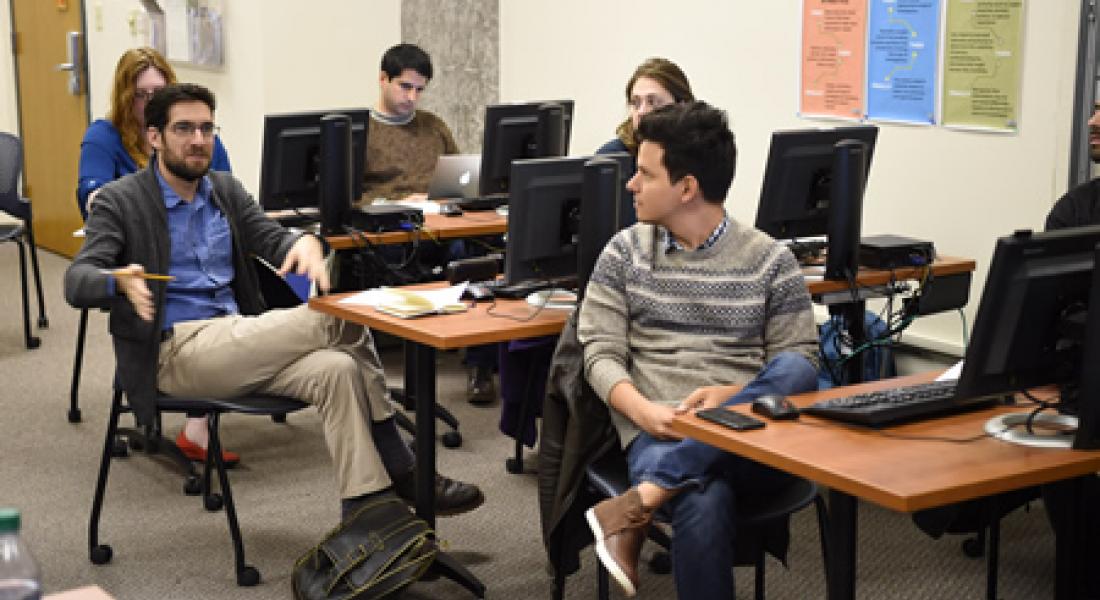
Former PhD Fellow Javier Osorio, now assistant professor of political science at John Jay College of Criminal Justice, City University of New York, returned to the Kellogg Institute last month to deliver a training on cutting-edge research software he has co-developed and to present his current work on the dynamics of criminal violence in Latin America to the Kellogg community.
The highly successful visit was the brainchild of current PhD Fellow Lucia Tiscornia, who knew of the software and its research potential from the time she and Osorio overlapped at Kellogg. A free, open-source content-analysis software, Eventus ID is designed to extract event data from newspapers by “reading” and processing text in various languages.
“I knew students and faculty here are working on projects for which such a tool could be really useful,” says Tiscornia. However, such “machine learning” tools, that use a computer to search for information, are not part of standard curricula and not easy to teach oneself.
“It is invaluable to have someone guide you through it,” Tiscornia says. The interactive workshop she organized took place in the Hesburgh Library, with each attendee set up at a computer with the software installed, so they could practice following Osorio’s instructions.
Fourteen participants at Notre Dame included Faculty Fellows Michael Coppedge, Victoria Hui, and Guillermo Trejo, Visiting Fellow Hernan Flóm, and graduate students from political science, sociology, history, and peace studies. Two CIDE students working on research with former Visiting Fellow Sandra Ley participated from Mexico City via Google Hangouts video conferencing.
“This was an exciting workshop,” Coppedge said. “It was a special opportunity to get in on the ground floor with pathbreaking software. It's a technique that would be difficult to learn from a book or paper, so the hands-on tutorial was essential for learning to employ this method. I was glad to see so many in attendance.”
The following day, Osorio presented his current research on “Multi-Actor Conflict and Violence in Colombia” as part of the student-organized Comparative Politics Workshop series, allowing researchers to see the software in action.
Multi-actor conflicts typically evade conventional methods and approaches, Osorio told the audience of roughly 40 PhD and LLM students, faculty members, and YLAI fellows from Latin America and the Caribbean. He showed how he connects different types of commodities—oil, coffee, coca—to territorial conflict and varying levels of violence.
“Javier sought to build a bridge between academia and practice by showcasing that the study of violence has real-life implications for real individuals,” noted Tiscornia, who says she has received very positive feedback on Osorio’s visit.
“The combination of a training session for the software with a presentation of his research on Colombia was incredibly productive,” said PhD Fellow Juan Albarracín Dierolf, who is studying criminal violence in Brazil. “It offered an introduction to software that can potentially improve the quality and scope of our data gathering while showing us its direct applications in research.”
Osorio’s presentation is one in an informal series highlighting innovative methodological approaches of interest to doctoral students and the Kellogg community more widely. Last year, Visiting Fellow Ana Arjona led a training on “memory workshops” in violent contexts, and an upcoming talk by Patrick Ball of the Human Rights Data Analysis Group will focus on using statistical tools to understand mass violence.
In organizing Osorio’s visit, Tiscornia drew on a tradition of scholarly events organized by doctoral students at Kellogg. In recent years, Albarracín arranged the visit of Colombian journalist and political analyst Claudia López and PhD students took the lead in organizing a major research workshop on democracy in Brazil, for example.
“We know the support is here at Kellogg for us to organize such events,” Tiscornia says. “You need to figure out what might benefit others and pitch it.”
The Kellogg Institute for International Studies, part of the University of Notre Dame’s new Keough School of Global Affairs, is an interdisciplinary community of scholars and students from across the University and around the world that promotes research, provides educational opportunities, and builds linkages related to two topics critical to our world—democracy and human development.
More on the training and lecture here





